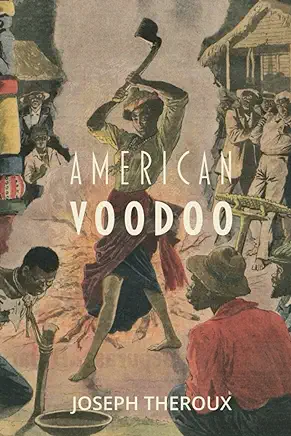Review | AMERICAN VOODOO by Joseph Theroux (Samoa)
 American Voodoo (with William Faulkner)
American Voodoo (with William Faulkner)
by Joseph Theroux (Western Samoa 1975-78)
Kilauea Publications
April, 2023
190 pages
$3.00 (Kindle); $10.00 (Paperback)
Reviewed by Stephen Foehr (Ethiopia 1965-66)
•
This novel reads like a police report. The style has a James Ellroyness quality — just the facts, sketch descriptions, no setups, expositions, or transitions. Get on with the story. The reader is immediately captured by the fast pace and carried along in the torrent of a murder mystery.
But an astute reader will tweak something is afoot by the name on the cover, the credit on the title page, and the subtitle “with William Faulkner in Louisiana.” Joseph Theroux’s name is on the cover in the usual author’s slot. The title page credits Lloyd Osbourne as the writer, edited by Joseph Theroux. The editor’s note identifies Joseph Theroux as the secretary for the Cemetery Advisory Committee. Lloyd Osbourne is quoted, “Now even my friend Bill Faulkner has reservations, but his, I suppose, are more personal than literary regarding the story of your state’s most notorious murderess.” The narration may be very unreliable.
And there is the title, American Voodoo.
Samuel Llyod Osbourne (1868-1947), American born, spent a life living in United States, Europe, and the South Seas. He was the of stepson of Robert Louis Stevenson. Stevenson chartered a yacht and sailed the family to the Samoan Islands, where they lived for four years, until Stevenson’s death. Llyod collaborated with Stevenson on three books and published eight books under his own name.
William Faulkner wrote a murder mystery, Light in August (1932).
Vodou, an organized religion with certified priest and prestresses, originated in West Africa and was transplanted to the Caribbean and South America by slaves. Santeria (Cuba) and Candomblé (Brazil) shared influences with Vodou. Hollywood’s depiction of Vodou has corrupted the practice into a Black Magic cult of voodoo. This novel does not ameliorate that misrepresentation.
Joseph Theroux’s novels feature famous authors (Stevenson, Arthur Conan Doyle, Somerset Maugham) and Lloyd Osbourne solving a murder mystery. Theroux artfully mixes fact with fiction and makes no attempt, to his credit, to be Truman Capote. Theroux served as a Peace Corps teacher in Samoa.
The first part of American Voodoo recounts, in ledger style, 36 axe murders of families as they slept. Faulkner invites Osbourne to meet with him in New Orleans “joining in the investigation” of the serial killer. (Faulkner lived in New Orleans for six months in 1925 while working on The Marble Faun.) Faulkner presents Osbourne with his archive of the murders and the convicted killer Clementine Barnabet. Barnabet had been sentenced to life in Louisiana’s notorious Angola State Penitentiary, but was inexplicably released. People connected to her conviction, and those who mistreated her in prison (forced hysterectomy), were turning up dead. Osbourne and Faulkner set out to track down Barnabet.
They act more as reporters interviewing sources than sleuths resolving clues. They discover their names on Barnabet’s revenge list, but are threatened by nothing more dangerous Osbourne’s dream about Barnabet grabbing his crotch and holding a blade to his throat. Eventually, they tracked Barnabet down to her swamp hideout, where she is preparing to eviscerate her father, which she successfully does, with the explanation that his abuse was as evil as the rapes on her committed by the church-going family men she had killed. In the tussle to capture her, she stabs Faulkner in the back with a scalpel. Osbourne shots her in the leg. She dives into the bayou. A crocodile drags her under water.
Osbourne and Falkner then have an incongruous chat about how to write a book. Faulkner confesses that he is a fraud. He never flew as a Canadian pilot in World War Two. The war ended before his training was completed. “How can I write a novel about the war knowing nothing?” He wrings his hands. Osbourne offers sage advice: “Write what you know. Write of your return home.” Faulkner told Osbourne about a new book he was pondering. “I’m thinking of calling it Soldier’s Pay.” Now we know the mystery of Faulkner’s muse for that novel.
In an Editor’s Postscript (presumably Theroux, as he was identified as the editor), the reader learns the suppose backstory. During spring break from Tulane, he was assignment to contribute to the Louisiana Oral History Project. His Aunt Cleo recounted the Clementine Barnabet story. She had telling insights to how Barnabet was “unfairly jailed for crimes committed by others.”
The novel is a short read, only 173 pages of generously double-space text unhindered by robust storytelling. Not to spoil the ending away, suffice to say it’s a much-chewed old chestnut.
•
Reviewer Stephen Foehr (Ethiopia 1965–66) is the author of numerous nonfiction and fiction books. Visit: StephenFoehr. com.
No comments yet.
Add your comment